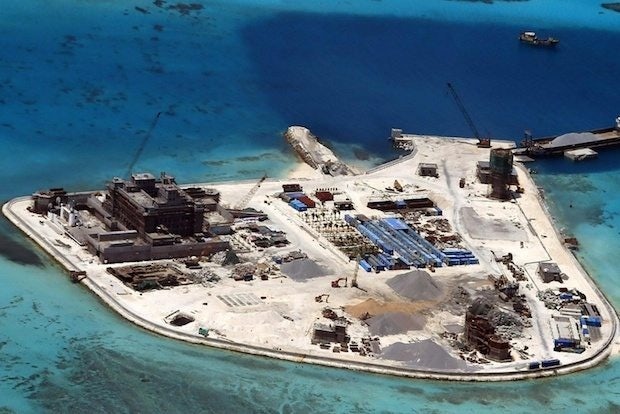
Construction by China on one of the disputed Spratly islands in the South China Sea. (Armed Forces of The Philippines)
Despite simmering territory disputes in the South China Sea amid furious construction of artificial islands, some wealthy Chinese property buyers are sinking their fortunes into their own islands in the region despite its ongoing instability.
Joining other toys for China’s ultra-wealthy, such as yachts and private jets, private islands have become a hot topic of late, with one island owner estimating there are at least 600 companies and individuals in China that have purchased their own islands. And as always with China, when a fad hits, there’s always someone there to hold a conference for it. Earlier this year, one such owner, businessman Lin Dong, organized the second “Chinese Island Owners’ Forum” as a part of a wider luxury fair in Guangdong—positioning tiny uninhabited islands alongside sports cars, personal helicopters, and yachts.
As Lin told AFP, the majority of private island owners in China are corporations with plans to build tourism developments, but individuals own others intent on using the islands to entertain friends and go on vacation. As Lin put it, members of his private island owners’ association "love nature, beaches, and lying on our backs listening to music.”
Despite high-profile cases of rich Chinese sinking millions into tiny islands in faraway locales like New Zealand—among them the sale of one island for $5.6 million to a “Chinese housewife” in April—the majority of purchases are happening in the South China Sea. China claims more than 7,300 islands of over 500 square meters in the disputed area. Until 2010, prospective land buyers were blocked from buying these islands from the Chinese government, but a Chinese law passed that year allowed them to purchase the rights to the islands for 50 years. Since then, land auctions have regularly taken place, pitting individual buyers against companies, with the companies typically winning out. According to AFP, however, a growing contingent of individual buyers is purchasing islands solely for leisure.
Buying a private island may sound like an ultimate luxury, but it’s certainly not without headaches when it's in the South China Sea. It’s not just the fact that the territory is disputed—Chinese authorities are an even bigger challenge to deal with. Due to inconsistent governance regarding private islands throughout China, some buyers have found themselves at risk of eviction, with their land rights unrecognized by provincial officials. "I don't dare to invest in the island, anything I build on it could be demolished,” said Lin to AFP.
As China’s rich learn to embrace the leisure lifestyle and gain growing interest in private island ownership, Chinese buyers will be more likely to skip questionable South China Sea purchases and buy islands in far-flung locales like Fiji, Canada, Scotland, and elsewhere—where their ownership (and safety) won’t be in question.